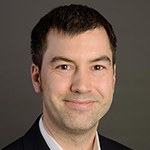Using Synthetic Biology to Improve Quality of Life
Research preceptor Keith Tyo talks about his work in synthetic biology as he attempts to make the energy and materials in the developed world available to all with the help of MBP students.
Growing up in rural West Virginia, Keith Tyo thought he knew what it meant to be disadvantaged.
His perspective changed after hearing stories from his father, who traveled to Haiti yearly with church mission trips and helped build infrastructure. It was then that he realized that even the most disadvantaged in the United States were still far better off than most Haitians or people in other developing nations around the world.
 “He was teaching us this idea of privilege,” said Tyo, now an associate professor of chemical and biological engineering at Northwestern and a research preceptor for students in Northwestern Engineering's Master of Biotechnology Program (MBP). “Early on, I recall really wanting to find ways to help improve the quality of life for this population, a population that is sometimes called the bottom billion.”
“He was teaching us this idea of privilege,” said Tyo, now an associate professor of chemical and biological engineering at Northwestern and a research preceptor for students in Northwestern Engineering's Master of Biotechnology Program (MBP). “Early on, I recall really wanting to find ways to help improve the quality of life for this population, a population that is sometimes called the bottom billion.”
Today, Tyo works with MBP students to improve the quality of life for the bottom billion using synthetic biology to find low cost and environmentally sustainable sources of energy and materials.
It's easy to say it would be great to extend the quality of life in the US to the rest of the world, Tyo said, but doing so would have disastrous effects on the planet.
“Our quality of life requires far too much energy and impact on the environment. It just wouldn't even be possible to scale it up to the whole world,” he said. “How do we make technologies that allow people to have a high standard of living without that environmental impact?”
That is the question Tyo routinely asks MBP the students with whom he works. He has mentored at least a dozen MBP students during his time at Northwestern, welcoming them into his lab as they pursue solutions to help improve the availability of sustainable fuels and chemicals.
One of the main focuses of his research is finding ways to genetically engineer microbes that can convert waste into needed chemicals that could help reduce reliance on unsustainable and polluting resources.
“There's this big opportunity to use all of these waste streams by converting them into chemicals or fuels that we can use for society,” Tyo said. “You're preventing pollution while at the same time producing a product that doesn't need to come from oil.”
Tyo said he has always been impressed by the high caliber of the students in MBP. Among the ones he's worked with, there are a number of common traits that have contributed to advancing his research.
“They are passionate students,” he said. “They definitely come in with a high level of maturity. They know what they want and are intentional about how they're approaching research.”
Research is a major component of MBP, making up around 40 percent of the curriculum. Tyo’s lab has given MBP students the opportunity to do a variety of hands-on work as he attempts to harness biological systems for the greater good.
No matter their contribution, Tyo said, all students who work in his lab walk away with a few important things in common.
“My most important goals are teaching students how to design and manage a project, having intermediate and long-term goals, managing risk, and then being able to communicate their findings effectively,” he said.
Those traits aren’t just addressed in Tyo’s lab. They are tenets of the MBP program.
“MBP is an excellent program if you are excited to get involved in the biotech industry, whether that's biomedical or the environmental side of things,” he said. “The program does a really good job plugging people in with different industries in terms of internships and helping with placement after graduation. They have a great pipeline for teaching the key skills that are helpful to succeed.”

